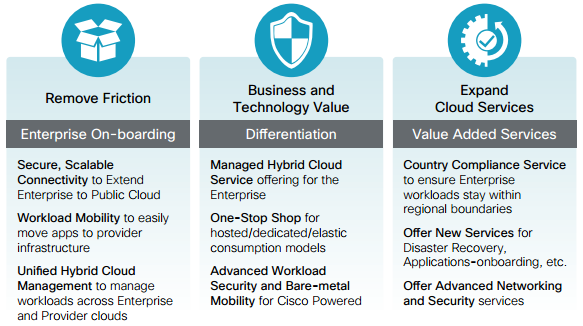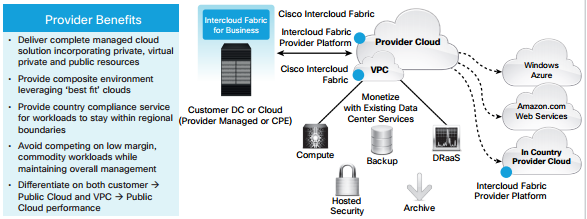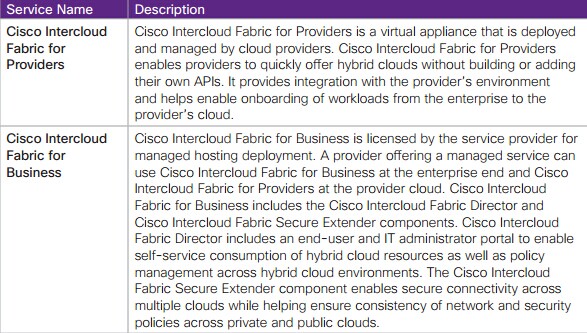
As a provider or a business, do you want to expand your data centers? When do you need it? Today, generally speaking, it happens when you need more computing and storage capacity than your own facilities provide, such as during holiday shopping. Cisco has a good solution for these providers and business to solve this problem of expanding data center capacity. That is the Cisco Intercloud Fabric. It allows your customers to extend their data and applications into your public cloud with the same performance, security, policies, and workload control that they have in their own data centers.
Main benefits of Cisco Intercloud Fabric for providers you can see the following figure.
A number of trends are prompting companies to use hybrid clouds, for example, they need the flexibility to add more capacity on demand without enlarging their data centers; they want added capacity to be available temporarily and to be able to use more or less capacity as needed; they need to control costs and ensure security; they need their extra capacity to behave just as it does in their data centers and internal clouds; they are tasked with controlling costs and helping ensure security and so forth. In addition, public clouds offer savings over building out a company’s own data center, and hybrid clouds can offer security and privacy.
What do you need? As a provider, give your customers flexibility and control, build deeper relationships you’re your customers, and differentiate your services.
Customers have many options for public clouds, and Cisco Intercloud Fabric for Providers can give your customers more reasons to choose your cloud services. Your customers can:
- Extend their workloads into your public cloud, expanding their own data centers while retaining control over both the on-premises operations and the parts of their workloads residing in your cloud
- Occupy a portion of your public cloud that is dedicated to them as a private cloud, using it as their entire data center; they don’t need any on-premises facility
- If you are already managing their on-premises data center, extend that data center into your public cloud, which you also manage
Cisco Intercloud Fabric for Providers is designed to be versatile and to make it easy for you to structure these different types of services and provide service differentiation.
The relationship you build with customers by the hosting of all or a portion of their data centers helps you build closer relationships and develop additional business opportunities. It offers an excellent way to prove your reliability and demonstrate that you’re willing and able to go beyond what is required to support your customers. With Cisco Intercloud Fabric for Providers, the differentiated services that you can offer your customers can secure your role as a trusted technology partner who understands your customers’ critical business needs.
Aggregate cloud services from other providers so you can be the single point of contact for your customers. Customers may want to use not only your cloud, but also those offered by other cloud providers. For example, regulatory oversight may require them to use a cloud within a particular country. One provider may specialize in their industry. Or they may simply like a given provider. You can offer your customers access to one, two, or more public clouds by configuring Cisco Intercloud Fabric for Providers to support these hybrid cloud deployments transparently, letting you become a cloud aggregator you’re your customers and serve as their single point of contact for cloud services. This gives you another way to differentiate your service from your competitors.
Cisco Intercloud Fabric for Providers use cases include the following:
- Capacity Augmentation: For example a retailer may need more capacity during peak shopping seasons, and a company may need more computing power to generate quarterly reports. Customers may also need more capacity when their contact centers are handling peak numbers of calls or they’re opening new facilities that strain their existing data centers. It’s critical that the capacity they add be indistinguishable from what their own data centers already provide. In this hybrid cloud, the public and private merge transparently both in the way that employees can use the additional resources and in the customer’s management of IT.
- Development and Testing: A customer’s encapsulated data center in your public cloud is an excellent place to test and develop new software. The development and testing don’t use data center resources that the company needs for day-to-day operations. When testing is completed, the software is ready to move into regular operations because it has been tested in the same environment in which it will run.
- Disaster Recovery: If disaster strikes, customers will benefit from a transparent extension of their on-premises data centers in your public cloud. They will have copies of their applications and their basic data center configurations. Customers can regenerate their policies and rules, recover much of their data, and continue to work even if the primary data center is down.
Become a Cloud Aggregator
The Main Services of Cisco Intercloud Fabric for Providers and Business
With Cisco Intercloud Fabric for Business, you can extend your data center or private cloud to the public cloud, allowing you to acquire the added capacity you need, with no demarcation between your internal cloud and the external one. You can also integrate your private cloud with clouds run by more than one service provider, with consistent network and security policies across private and public clouds, With Cisco Intercloud Fabric for Business, you get the agility, capacity you need, as well as security and control.
What Do You Need Cisco Intercloud Fabric for Business?
The Power to Extend Your Company’s Own Capabilities
Cisco Intercloud Fabric for Business lets you create a hybrid cloud to extend your own data center and cloud capacity when you need it. The cloud extension is provisioned with your own applications, so you can scale the applications when you need to. You can access more computing power, all of it operating just as if it were in your on-premises data center. You extend your own security and quality of service (QoS), access control lists, and other policies, enabling the public cloud to act as part of your own cloud.
The Ability for Your Own IT Staff to Control and Maintain Additional Capacity
You may be reluctant to place your company’s data and applications in a public cloud, stored away from your own premises. That’s understandable. Data and applications are among your company’s most important assets. To be sure that nobody else can gain access, you need security to be just as strict as on company premises. In addition, you need your workers to have the same QoS when they use applications and tools in the cloud as they have on your premises.
The Cisco Intercloud Fabric for Business solution encapsulates your enterprise applications and places them within a public cloud. You can have the same security, you can enforce the same policies, and you can troubleshoot your own problems. Although you’re just renting the capacity, you manage it, you control it, and for all practical purposes, you own it. And you determine when the added capacity is called into use.
A Choice of Cloud Providers
In some cases, the applications you use run on an operating system that is tied to a particular cloud provider, or the public cloud may be specific to certain industries. In other cases, you need to comply with regulations that limit the processing of some data to a specific country, so you need a provider that resides in that country. Perhaps you just find a given provider easy to work with, or you have different applications that have different SLA requirements.
With Cisco Intercloud Fabric for Business, you can link to the cloud provider of your choice. And you can link to more than one. Each instance of your data center in a cloud has the same attributes as the first one: the same security, the same control, and the applications and access you place in it. You can even move applications between your private environment and your extensions in the public cloud.
More about Cisco, Cisco hardware, networking, etc. you can visit the https://blog.router-switch.com/, more topics you may be interested in…





